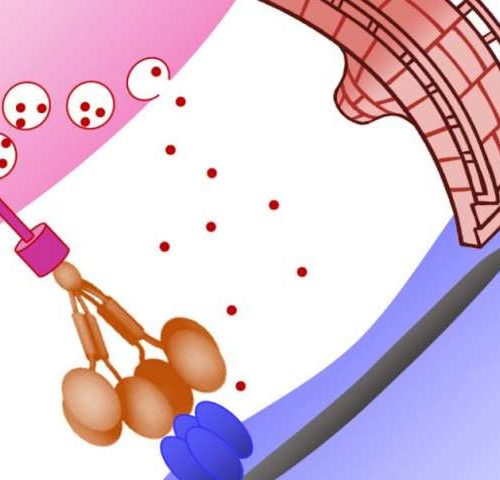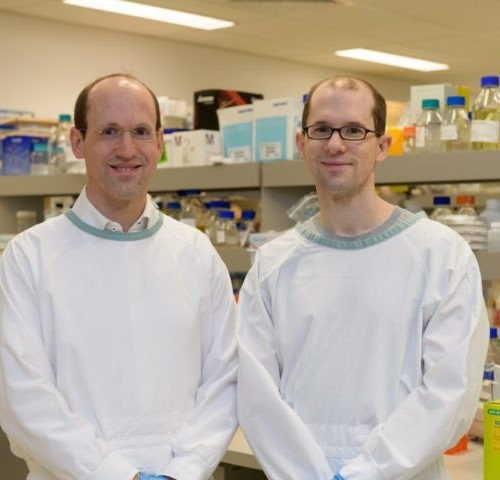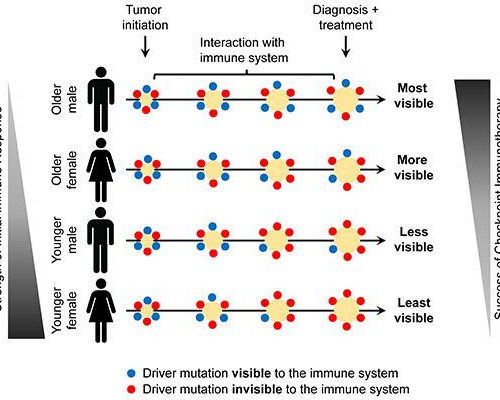by Ellen Goldbaum, University at Buffalo This image shows axons in vitro 24 hours after injury. The presence of Schwann cells (nuclei in cyan) helped maintain the integrity of axons (in magenta and yellow). Credit: Elisabetta Babetto, HJKRI Axons are long, finger-like projections of neurons that transmit critical signals throughout the nervous system. But because...
Tag: <span>diseases</span>
A tailor-made molecule that ties nerve connections
by German Center for Neurodegenerative Diseases CPTX (orange) combines functional domains present in natural synaptic organizing proteins in a unique way. The compound was designed to act as a universal bridge builder for excitatory connections between nerve cells. Credit: DZNE / Alexander Dityatev Researchers from the German Center for Neurodegenerative Diseases (DZNE), UK and Japan...
Gene therapy could potentially reverse memory loss from Alzheimer’s in humans
Researchers from Macquarie University have discovered a world-first new treatment that reverses the effects of memory loss associated with Alzheimer’s disease in a study of mice with advanced dementia. The research, co-led by two brothers, Dr Arne Ittner and Professor Lars Ittner, from Macquarie University Dementia Research Centre, builds on their work begun in 2016...
Antibiotics associated with increased risk of inflammatory bowel disease
Antibiotics use, particularly antibiotics with a greater spectrum of microbial coverage, may be associated with an increased risk of new-onset inflammatory bowel disease (IBD) and its subtypes ulcerative colitis and Crohn’s disease. That is according to a study by researchers at Karolinska Institutet in Sweden and Harvard Medical School in the U.S., published in the...
Low humidity increases COVID risk; another reason to wear a mask
Dry air could prompt further disease spread A study focused on the Greater Sydney area during the early epidemic stage of COVID-19 found an association between lower humidity and an increase in community transmission. Now a second study by the same team confirms the risk. The study is published today in Transboundary and Emerging Diseases....
Childhood syndrome linked to COVID-19 causes profound immune changes
NATIONAL INSTITUTE FOR HEALTH RESEARCH Researchers have uncovered how the immune system is altered in a rare COVID-19 related illness in children referred to as paediatric inflammatory multisystem syndrome (PIMS-TS). PIMS-TS is a rare syndrome which has emerged in a small number of children during the COVID-19 pandemic. The condition causes severe inflammation in blood...
Bacteria’s secret weapon revealed
Monash Biomedicine Discovery Institute (BDI) scientists have discovered a previously unknown method used by bacteria to evade immune responses. The study, published in Nature Microbiology, points to potential new ways of countering bacterial infections, which are becoming increasingly resistant to antibiotics. First author Dr Pankaj Deo said researchers in Dr Thomas Naderer’s laboratory took a...
New study: Hydroxychloroquine ineffective as a preventive antiviral against COVID-19
CLEVELAND–Researchers at Case Western Reserve University have added to the growing body of understanding about how hydroxychloroquine (HCQ) is not a possible defense against COVID-19. Specifically, they found that HCQ is not effective in preventing COVID-19 in patients with lupus and rheumatoid arthritis (RA), suggesting a broader interpretation of HCQ as ineffective preventive medicine for...
Why young and female patients don’t respond as well to cancer immunotherapy
Tumor cells in younger and female patients accumulate cancer-causing mutations that are more poorly presented to the immune system, better enabling tumors to escape detection and clearance UNIVERSITY OF CALIFORNIA – SAN DIEGO DUE TO A PROCESS KNOWN AS IMMUNO-EDITING, YOUNGER AND FEMALE PATIENTS WITH CANCER HAVE CANCER-CAUSING GENETIC MUTATIONS THAT ARE LEAST VISIBLE TO...
TEENS WHO VAPE FACE MUCH HIGHER RISK OF COVID-19
Teenagers and young adults who vape face a much higher risk of COVID-19 than their peers who do not vape, according to new research. The study is believed to be the first to examine connections between youth vaping and COVID-19 using US population-based data collected during the pandemic. “WE NEED TO TELL EVERYONE: IF YOU...





